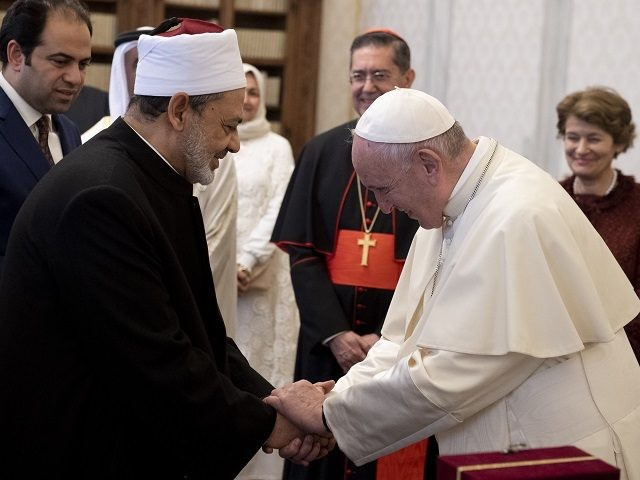Pope Francis, the Grand Imam Ahmed Al-Tayeb of Al-Azhar of Egypt, and his retinue on Friday was the latest in a series of get-togethers between the two leaders.
Last February, the pope and the grand imam signed a joint declaration in Abu Dhabi, condemning “acts of murder, exile, terrorism and oppression” carried out in God’s name.
We “resolutely declare that religions must never incite war, hateful attitudes, hostility and extremism, nor must they incite violence or the shedding of blood,” the 3,000-word text reads. “These tragic realities are the consequence of a deviation from religious teachings.”
“We thus call upon all concerned to stop using religions to incite hatred, violence, extremism and blind fanaticism, and to refrain from using the name of God to justify acts of murder, exile, terrorism and oppression,” the two leaders declared.
“God, the Almighty, has no need to be defended by anyone and does not want His name to be used to terrorize people,” they said.
The nearly 3,000-word text, titled “Declaration on Human Fraternity for world peace and living together,” was signed in Abu Dhabi Monday by Pope Francis and the Grand Imam of Al-Azhar University in Cairo during a global conference on the same topic.
Along with the Grand Imam, Pope Francis also received Deputy Prime Minister of the United Arab Emirates, Saif bin Zayed Al Nahyan, the Ambassador of the Republic of Egypt to the Holy See, Mahmoud Samy, and some personalities and representatives of the University of Al-Azhar and the Superior Committee in the Vatican Friday, according to a communique of the Holy See Press Office.
In August, the Vatican announced the creation of a special committee to further elaborate the principles contained in the controversial Abu Dhabi document, and Friday’s meeting sought to follow up on the objectives contained in the document.
The text was subsequently criticized by prominent theologians for “devaluing the person of Jesus” and “undermining the gospel itself” since it seemed to propose that God willed the existence of a plurality of religions just as he wills a plurality of sexes, races, and languages, rather than willing that all people find their salvation in Jesus Christ.
The passage that caused the most furor reads, “The pluralism and the diversity of religions, color, sex, race and language are willed by God in his wisdom, through which he created human beings.”
This Abu Dhabi declaration elicited a wave of criticism from Catholic theologians, who insisted that such a statement seemed to suggest that either God actively wills error, or that all religions are equally valid paths to God. The existence of a variety of colors, races, and languages in humanity is very different from a variety of contradictory claims about God’s identity and way of acting, they insisted.
Pope Francis has said he is pleased that the joint document, titled Human Fraternity for World Peace and Living Together, would become the object of study and a font for new initiatives in interreligious dialogue.
“Although sadly evil, hatred and division often make news, there is a hidden sea of goodness that is growing and leads us to hope in dialogue, reciprocal knowledge and the possibility of building, together with the followers of other religions and all men and women of good will, a world of fraternity and peace,” Francis said in an August communiqué.
The Vatican called Friday’s meeting “cordial,” saying that the issue of the protection of minors in the digital world had been discussed, as well as the pope’s recent visit to the United Arab Emirates.

COMMENTS
Please let us know if you're having issues with commenting.